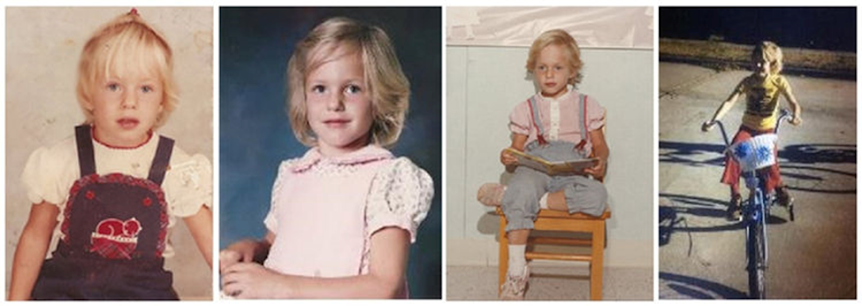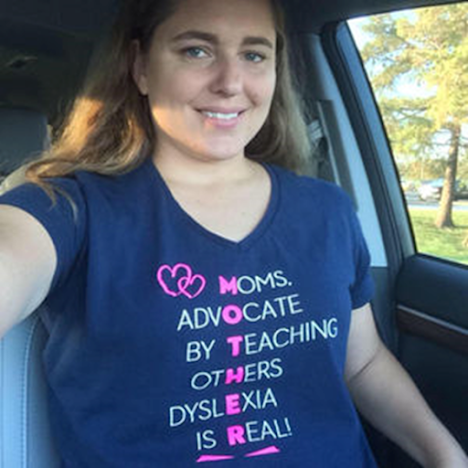Part 2: So, here’s the thing….
I wondered what the chances were that my child could have the pain of dyslexia. So, I started researching. I learned a lot of my personality quarks were a result of my dyslexia. That a lot of my struggles traced back to it. So, I kept learning and researching. My oldest daughter started showing early signs of dyslexia. I wondered if these signs were there or if my paranoia was putting them on her.
Julia is a bright, happy girl that was born 5 weeks early and has not stopped running forward in life. Every Dr. Office visit, we would hear, “If she is not where the average child is, give her 5 weeks to catch up.” After a couple months of this, the Dr. moved her off the Preemie chart onto the normal child chart. She was measuring, in growth and development, ahead of her age. There were times Julia would have to perform ‘tricks’ to show the Dr. we were not making things up. He was always surprised at how advanced she was for her age.
I have known, all of Julia’s life, that she was special. Gifted. She did not act or talk like children her age. She was always more comfortable with older children and adults. At her Preschool, because of her development, she advanced some classes early. The teachers recognized that when bored, she would become a different child. She would lose attention, act up, etc. They adjusted the class to challenge her, and it worked. In Pre-K, she was placed in an advanced room with other children born after the school cut off of September 1st, but before Jan 1st of the following year. In this room, she began to learn to read and do basic addition and subtraction. She reversed so many letters & numbers and could mirror write with ease. I brought this up to the preschool teacher (she had a degree in special education) and was told this was all normal and developmentally appropriate.
The year before Julia started Kindergarten, I got with her principal to see what it would take for her to start elementary school early. I went over my concerns. I told them that she was advanced but showed early signs of dyslexia. They said they would watch. The dyslexia specialist was notified.
Julia started kindergarten during the 2013/2014 school year. During this time, her teacher came to me 3 different times with different issues. All relating to dyslexia. I did not tell the teacher I felt she was dyslexic; I wanted her teacher to see it. I wanted to be sure I was not putting it on her because of my fears. After the 3rd time, I opened up. Her teacher agreed that these were valid concerns and got with the dyslexia specialist. Once again, she was on watch. Julia was also evaluated for the GT\ALPHA program. 100% of kindergartners are screened. I was excited for this. My hope was for her to get in and be challenged at her level. To be accepted, I was told the student would have to have a 97% average. Julia was not a 97% average student. I accepted this and hoped for next year.Out of frustration for Julia’s struggles, I continued my research. I found a wonderful podcast that really helped. The Dyslexia Quest with Elisheva Schwartz. I watched YouTube videos and fell in love with Piper Otterbein.
Continuing my quest to get Julia the help she needed, I decided to tell her first-grade teacher up front that I suspected she had dyslexia. At our parent teacher conference, I was ready to bring it up, but the teacher brought it up first. She felt that because of Julia’s intelligence that the district would not test her for dyslexia. She was going to submit examples and discuss dyslexia and dysgraphia with the team. She also suggested that we fill out the paperwork for GT\ALPHA testing. Again, Julia did not qualify. For Julia’s struggles, a meeting was held, ISD people only, and it was decided that Julia was not dyslexic and did not qualify for an evaluation.I was angry and sad. And returned to my research.
I noticed my daughter was getting grades for work that she did not earn. I brought it up to the teacher and she said she knew Julia was capable of doing the work. That she felt Julia knew the material. That she was smart. So, she gave her higher grades. I requested she give Julia the grades she earned. Our ISD grades on a scale of 1 to 4. 1 being the lowest, and 4 being you know it so well you can teach it. Julia was earning 3s and 4s but deserved 2s on some of her work. So, for one 9-week grading period, Julia earned her 2s. I was excited that we could now show that she was a struggling student. The next 9 weeks, she was back to 3s and 4s.
Frustrated, I started using the research I had
done.
I had made connections with other parents and advocates on Facebook. I used a request to test letter and modified it to fit my daughter.
On May 13, 2015, I submitted my letter to the principal to request testing under Special Education. I knew that she would not qualify for Special Ed, but I knew it was the only way to get her tested. I received a call that day from the vice principal. She was going to review Julia’s file, get with her teacher, and get with the dyslexia specialist. She was under the impression that the case was reviewed in an RTI meeting, but it was a data meeting. Her understanding of the data meeting was that it was decided that Julia did not qualify based on academics. She would get with the district dyslexia lead if necessary.
A week later, consent to test papers were signed. All the ‘i’s were dotted and the ‘t’s crossed. Now I waited for the testing to be complete.
Second grade started and, once again, I went to discuss Julia with her teacher. It was comforting to know that her teacher was familiar with dyslexia and had experience working with dyslexia. Once again, her teacher recommended Julia be tested for the GT program.






Comments
Post a Comment